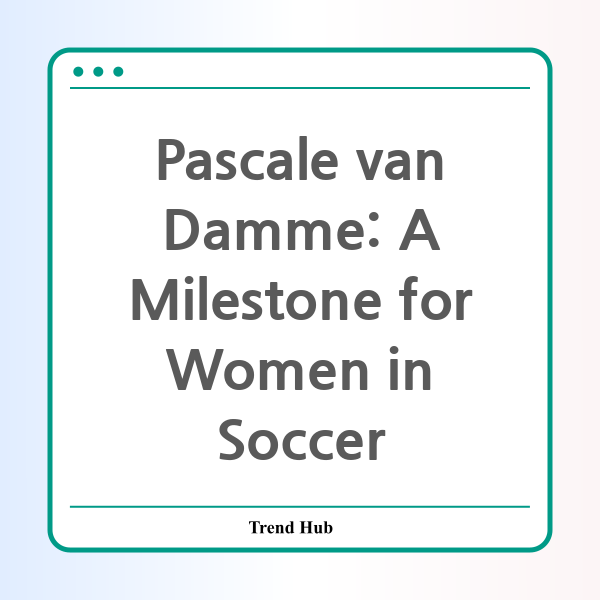* This website participates in the Amazon Affiliate Program and earns from qualifying purchases.

Have you ever thought about how the landscape of soccer is evolving, especially concerning women's representation in its highest echelons? The recent announcement of Pascale van Damme’s unopposed candidacy for a seat on FIFA's ruling council serves as a pivotal moment in the world of soccer, highlighting the increasing prominence of female leaders in the sport.
Van Damme, who has been at the helm of the Belgian soccer federation for less than two years, is set to officially join FIFA’s decision-making body on April 3, 2025, during the UEFA congress in Belgrade, Serbia. As the only candidate vying for this prestigious position, her election marks a significant advancement for female representation within FIFA, an organization that has long been criticized for its lack of gender diversity at the highest levels.
Let's take a closer look at the implications of this historic event:
Breaking the Glass Ceiling
Van Damme’s unopposed election underscores a critical shift in the soccer world that has seen women break through the barriers of what has traditionally been a male-dominated sphere. Her term will last four years, and with an annual salary of $250,000, it’s a clear indication that FIFA is beginning to value the contributions of female leaders more tangibly. When Van Damme takes over, she will replace Evelina Christillin, who held the post for over eight years and became the first woman elected to the FIFA council by UEFA in 2016. Christillin's legacy was significant, paving the way for future female leaders like Van Damme.
A Historic Precedent
Interestingly, all seats for female representatives on FIFA’s council have been won without contest, indicating that while progress is being made, there is still a long road ahead for equitable representation. Each of soccer’s six continental confederations is mandated to have a female representative, yet to date, none have faced a contested election against their male counterparts. This fact serves as a reminder of the challenges that women still face despite strides toward inclusion.
Looking Ahead: Future Opportunities
As Van Damme prepares for her new role, there is also a broader context to consider regarding women’s representation within UEFA and FIFA. With the upcoming elections, UEFA is set to fill several vacant seats, including another slot reserved for a female candidate. One potential candidate is Lise Klaveness, the president of the Norwegian soccer federation. This ongoing evolution within soccer governance reflects a more deliberate effort to include women in leadership roles at all levels.
The Bigger Picture
While Van Damme's election tells a story of progress, it also amplifies the need for continued advocacy for women in sports. The leadership role she assumes is not merely a milestone for her but a beacon of hope for aspiring female leaders worldwide. The strong hope is that her position will inspire a new wave of female leaders in soccer and other sports disciplines to not only aspire for leadership but also create pathways for others to follow.
In conclusion, Pascale van Damme's anticipated role on the FIFA ruling council heralds a new chapter in soccer governance, emphasizing the importance of women in leadership roles. This moment is a reminder that change is possible, and it’s a thrilling time to witness the evolution of soccer as it continues to strive for both inclusivity and equality.
* This website participates in the Amazon Affiliate Program and earns from qualifying purchases.